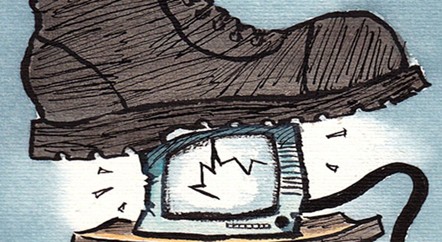
『作為媒體行業(yè)中重要的贏利模式以及產(chǎn)出精彩節(jié)目的主要來源,付費(fèi)電視模式日漸衰落。』
The future of pay-television:Breaking the box
付費(fèi)電視的未來:推陳出新
Aug 20, 2011 | From The Economist

FIFTEEN years ago nearly all the television shows that excited critics and won awards appeared on free broadcast channels. Pay-television (or, as many Americans call it, “cable”) was the domain of repeats, music videos and televangelists . Then HBO , a subscription outfit mostly known for boxing and films, decided to try its hand at hour-long dramas.
What began as an interesting experiment has become the standard way of supporting high-quality programming. Most of the great television dramas that are watched in America and around the world appear first on pay-TV channels. Having shown others how to make gangster dramas with “The Sopranos ”, HBO is laying down the standard for fantasy with “Game of Thrones ”. Other pay-TV channels have delved into 1960s advertising (“Mad Men ”), drug dealing (“Breaking Bad ”) and Renaissance court society (“The Borgias ”). Pay-TV firms outside America, like Britain’s BSkyB , are beginning to pour money into original series. Talent is drifting to pay-television, in part because there are fewer appealing roles in film. Meanwhile, broadcast networks have retreated into a safe zone of sitcoms , police procedurals and singing competitions.
Subscription has proved by far the best way of paying for high-quality television. Advertising veers up and down with the economic cycle, and can be skipped by using digital video recorders. And any outfit that depends on advertising is liable to worry more about offending advertisers than about pleasing viewers. Voluntary subscription is also preferable to the compulsory, universal variety that pays for the BBC and other European public broadcasters. A broadcaster supported by a tax on everyone must try to please everyone. And a government can starve public broadcasters of money, too—as the BBC is painfully learning.
But pay-television is now under threat, especially in America. Prices have been driven so high at a time of economic malaise that many people simply cannot afford it. Disruptive , deep-pocketed firms like Amazon and Netflix lurk , whispering promises of internet-delivered films and television shows for little or no money. Whether the lure of such alternatives or poverty is what is causing people to cancel their subscriptions is not clear. But the proportion of Americans who pay for TV is falling. Other countries may follow.
Pay-TV executives argue that people will always find ways of paying for their wares, perhaps by cutting back on cinema tickets or bottled water. That notion seems increasingly hopeful. Every month it appears more likely that the pay-TV system will break down. The era of ever-growing channel choice is coming to an end; cable and satellite distributors will begin to prune the least popular ones. They may push “best of basic” packages , offering the most desirable channels—and perhaps leaving out sport. In the most disruptive scenario, no longer unimaginable, pay-TV would become a free-for-all, with channels hawking themselves directly to consumers, perhaps sending their content over the internet. How can media firms survive in such a world?
It won’t be easy. They will have to start marketing heavily: at present the pay-TV distributors do that for them. They must produce much more of their own programming. Repeats and old films lose their appeal in a world in which consumers can instantly call up vast archives . If they are to sell directly to the audience they will have to become technology firms, building apps and much slicker websites than they have now, which anticipate what customers might want to watch.
But television as a whole should emerge stronger. If people buy individual channels rather than a huge bundle , they will have to think about what they really value—the more so because each channel will cost more than it does at present. Media firms will improve their game in response. The activity that diverts the average American for some four and a half hours each day should become more gripping , not less. (634 words)
特別聲明:①凡本網(wǎng)注明稿件來源為"原創(chuàng)"的,轉(zhuǎn)載必須注明"稿件來源:育路網(wǎng)",違者將依法追究責(zé)任;
②部分稿件來源于網(wǎng)絡(luò),如有侵權(quán),請聯(lián)系我們溝通解決。
25人覺得有用
24
2011.10
海文考研英語模考班(網(wǎng)授) 開班日期:2011年11月中下旬 上課提示:下午:13:30 優(yōu)惠價(jià):......
24
2011.10
『如今,美國的數(shù)學(xué)教育引起了國人的廣泛擔(dān)憂。數(shù)學(xué)源于實(shí)際生活應(yīng)用,但美國現(xiàn)行的數(shù)學(xué)課程已與生活脫......
24
2011.10
海文考研英語沖刺串講班 開班日期:2011-11-26 ~ 2011-11-27 優(yōu)惠價(jià):¥350元 課時(shí):16......
24
2011.10
海文考研英語超級作文模板班 開班日期:2011年11月底 上課提示:共4次課,(一上午算一次課)......
24
2011.10
有效幫助考研的同學(xué)培養(yǎng)語感,建立良好的英語閱讀環(huán)境,有助于考研英語閱讀成績的提高。 『經(jīng)濟(jì)危機(jī)使......
24
2011.10
『實(shí)驗(yàn)表明,當(dāng)一些人自認(rèn)為已經(jīng)做了一些有益健康的事情時(shí),即便事實(shí)并非如此,他們也會(huì)容許自己做一些......